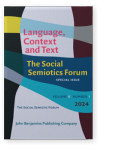Moving towards peace, compassion and empathy through semiotic enquiry
In our interconnected world, exposure to hate, fear, violence and adversarial communication is commonplace. Yet,
this exposure underscores the urgent need for a more just, peaceful, and inclusive society. While research stresses the importance
of nurturing peace, compassion and empathy for enhanced well-being and social justice, these three terms are rarely discussed at
length in linguistics and communication studies. Little systematic work explores how language and semiotic resources actualise
these ideals across contexts. This special issue, grounded in systemic functional linguistics, addresses this gap. It aims to
contribute to a more just world, promote non-violent efforts for social justice, and lay the foundation for future research on the
semiotics of peace, compassion and empathy. This paper outlines key definitions and contributions.
Article outline
- 1.Introduction
- 2.Defining “peace”, “compassion” and “empathy” in the special issue
-
Macquarie dictionary (2nd edition)
- 3.Overview of the articles in the special issue
- 4.Final remarks
-
References
